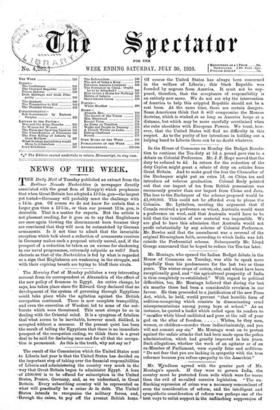In the House of Commons on Monday the Budget Resolu-
tion to continue the Tea-duty at 5d. a pound gave rise to a debate on Colonial Preference. Mr. J. F. Hope moved. that the duty be reduced to 4d. In return for the reduction of the duty Ceylon might grant a rebate of duty on articles from Great Britain. And to make good the loss the Chancellor of the Exchequer might put an extra ld. on China tea and introduce ad valorem. graduation. Colonel Seely pointed out that our import of tea from British possessions was enormously greater than our import from China and Java. The loss to the Exchequer of the scheme proposed would be £1,000,000. This could not be afforded even to please the Colonies. Mr. Lyttelton, meeting the argument that if Canada received a preference on wheat, Australia would want a preference on wool, said that Australia would have to be told that the taxation of raw material was impossible. We are glad to have this admission that Australia would not profit substantially by any scheme of Colonial Preference. Mr. Bowles said that the amendment was a reversal of the original Birmingham faith, according to which India was left outside the Preferential scheme. Subsequently Mr. Lloyd George announced that he hoped to reduce the Tea-tax later.






































